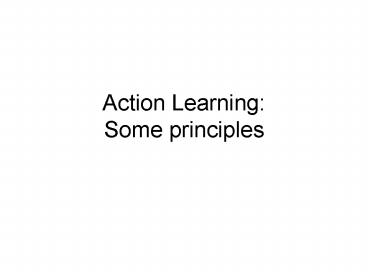Action Learning: Some principles - PowerPoint PPT Presentation
Title:
Action Learning: Some principles
Description:
Action Learning: Some principles Experiential learning Reflection Experience Testing Generalisation The Kolb cycle The learning process Planning Experience Action ... – PowerPoint PPT presentation
Number of Views:88
Avg rating:3.0/5.0
Title: Action Learning: Some principles
1
Action LearningSome principles
2
Experiential learning
Experience
Testing
The Kolb cycle
Reflection
Generalisation
3
The learning process
Experience
Action
Observing and reflecting on the consequences of
action in a situation
Acting or trying out the plan in the situation
Planning
Understanding
Forming or revising understanding of a situation
as a result of experience
Planning actions to influence the situation based
on newly formed or revised understanding
4
The learning process (2)
Learning Progammed Knowledge Insightful
Questions (Revans, 1973)
- Programmed knowledge
- What we usually deal in
- Conveyed through
- books,
- lectures
- structured learning
- Revans associated with
- poppycock
- platitude
- professor
- Insightful questions
- Asked at the right time
- Based on experience or attitudes to project
work - objective to drive work forward
- Revans associated with
- query
- quiz
5
Features of action learning
Voluntary
Participantexperts
Reflection on experience
Empowering
Gradual development
Mutual supportand challenge
Holistic approach
6
Implementation in final year
- Action learning used in final year course, 25
students - Class divided into three sets at the start of
the semester - Introductory workshop top-up reviews of
process - Involved students in setting syllabus and
learning outcomes
- Possible problems
- Not understanding process of action learning
- Trying to solve each others problems
- Lack of subject knowledge
7
Implementation in second year
- Action learning used in three courses (75, 70 and
35 students) - AL sets combined for first two courses eight
sets - Separate sets for third course (semester 2)
- Introductory workshop some guided discussion
- Single sets met in my office
- Substantial differences in attitudes between
semesters
- Possible problems
- Not understanding process of action learning
- Trying to solve each others problems
- Lack of subject knowledge
- Fear of sharing knowledge perception of zero
sum game - Limited fluency in English
- Ownership of space physical and intellectual
8
Student attitudes (1)
Action learning required a different type of
engagement
A lot of your lectures are clean cut, this is the
question, this is how we want you to do it, . . .
with a lot of coursework it was just answer this
question.
For a lot of your kind of exams and that stuff,
it is very focused, so you dont really have a
choice of how you go about it.
9
Student attitudes (2)
Action learning promoted deeper learning and
reflection
Initially you presented your faults and your
progress and then others were asking through
constructive questions to understand in more
detail what you were actually doing.it was the
first time Ive done any such thing as action
learning and initially I found it a bit
challenging
encouraged to do much more personal research and
actually take our own initiative where we want to
go and sort of do our own research, what topics
to choose... and go really deep into them
10
Student attitudes (3)
Action learning is a useful skill that requires
practice
Gradually it became better as we all got deeper
into the research questions or the questions we
were researching because then it became much
clearer who was keen on working and we started to
ask the right questions because we knew a bit
more
Be the active member of the discussion and be
sort of the one who can direct the speaker
through constructive questions to help them learn
and reflect on how they do their own research and
how they go about doing their other coursework.
11
Staff expectations
- Students will use action learning sets to reflect
not just upon the projects that they were
ostensibly set up to support, but the much wider
range of issues that they confront in their
learning. - Students would use action learning sessions to
identify the resources that they needed in order
to solve the problems that they had identified,
and, especially in the context of project work,
that this might include consulting a subject
expert on the teaching staff. - Students will approach their work in a semester
as a project, and plan early on how they are
going to assign resources across activities, so
that from a given starting point, the desired
outcome might be achieved.
12
Communities of practice
Final year students established common knowledge
and understanding repertoire of approaches to
engaging in supporting each others
learning believed this was necessary for them to
learn effectively together
13
Communities of practice
You couldnt have done it in second year. Theres
no way you could have done it because there
wasnt the knowledge. Maybe in some other
subjects you could have got away with it but I
dont think in economics you could have pushed it
much earlier.
The background knowledge is really really
important for the success of the action learning.
That you were actually able to give people enough
understanding for feedback
And to understand that we could sort of see where
they were trying to come from rather than just
listening for 10 minutes to something we hadnt a
clue about.
We knew enough of the subject roughly to make
comment on what they were trying to do.































